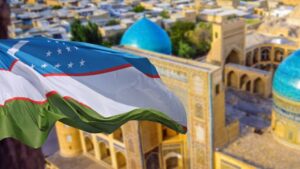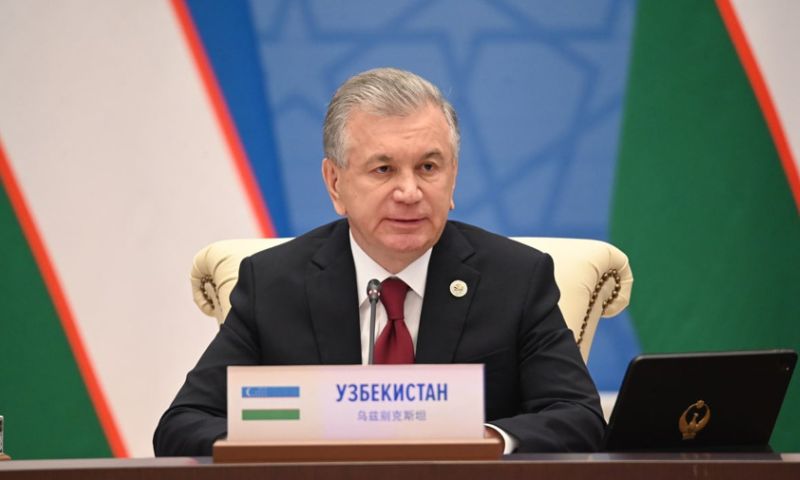Uzbekistan, a country with a rich historical heritage and strategic geopolitical position, plays a vital role in Central Asia. The transformation taking place under the leadership of President Shavkat Mirziyoyev, with an emphasis on new foreign policy strategies, an active position in regional and international initiatives, and the development of economic ties and integration, serves a sustainable and prosperous future for the entire region.
Since taking office in 2016, President of Uzbekistan Shavkat Mirziyoyev has taken ambitious steps to transform the country, seeking to build a New Uzbekistan based on the principles of democracy, respect for human rights, and market policies. These efforts led to significant domestic reforms, including adopting a new Constitution, a religious freedom law, criminalizing domestic violence, and strengthening the protection of private property with an emphasis on economic development. These achievements have improved relations with key allies and partners, especially China, the United States, and Russia.
Uzbekistan’s foreign policy is focused on strengthening bilateral ties with its closest neighbors, particularly Kazakhstan, as a result of which agreements on alliance relations and border demarcation were signed. Significant progress was also achieved in interaction with Turkmenistan, which was marked by signing the Strategic Partnership Agreement. Ties with Tajikistan are also progressing, as evidenced by the abolition of the visa regime and the joint construction of a hydroelectric power station.
Particular attention is paid to the problem of water resources in the region. In this regard, initiatives were put forward to build a new canal in the Amudarya basin.
Uzbekistan is also actively manifesting itself within the SCO, the Organization of Turkic States, and other international platforms, seeking to strengthen regional dialogue and cooperation, including with key world powers. An essential part of the country’s foreign policy is cooperation in the use of water and energy resources, considering the importance of regional integration.
At the beginning of 2024, Uzbekistan’s economy shows encouraging growth and development trends. According to forecasts, the country’s GDP will grow by 5.5-5.6 percent this year. This indicator aligns with Uzbekistan’s strategic goal of increasing GDP per capita to $4 thousand by 2030 and is supported by various sectors, including the services sector, industry, construction, and agriculture.
Fiscal policy reforms also continue to ensure macroeconomic stability despite global economic challenges, which means that the government’s proactive measures to ensure economic sustainability have proven highly effective.
The volume of capital investment is increasing significantly, stimulated by foreign investment, corporate funds, and bank loans.
Uzbekistan issued $1 billion in international sovereign bonds for green financing for the first time, demonstrating the country’s commitment to addressing environmental issues and promoting energy-saving technologies. This has opened up opportunities for investment in environmentally sustainable projects.
The country has successfully implemented important regional transport initiatives to strengthen Central Asia’s economic integration and trade development. One such initiative is the $7 billion Trans-Afghan Railway project, creating a vital transport link between South and Central Asia.
Launched in 2018, the project involves the construction of a 573-kilometer railway that will connect Uzbekistan with ports in Pakistan and Iran via Afghanistan. This will significantly speed up the delivery of goods and positively impact the region’s economic development. An essential part of the project is the training of Afghan railway specialists.
In addition, Uzbekistan advocates activating China – Kyrgyzstan – Uzbekistan (CKU) railway line project, gaining momentum after many years of discussions. This project is of great importance for developing regional trade and economic integration. The CKU rail line is designed to connect Kashgar in China with the city of Andijan in Uzbekistan via Kyrgyzstan, providing access to markets in Southeast and West Asia, Türkiye, and the Middle East. This will strengthen the position of Uzbekistan and Kyrgyzstan as important transit countries from China to Europe and the Middle East, facilitating the creation of a new strategic logistics network along the Belt and Road Initiative (BRI) route.
By demonstrating leadership in these initiatives, Uzbekistan strengthens its role as a key player in the region, promoting regional stability and integration.
In recent years, Uzbekistan has significantly increased its diplomatic activity in the international arena. Having come to power, Shavkat Mirziyoyev gave new impetus to efforts to resolve the Afghan issue and called on the world community to coordinate actions within the UN to stabilize the situation in this country.
Uzbekistan also puts forward and implements many initiatives and transregional projects. A significant step is simplifying visa requirements, which helps strengthen economic cooperation and cultural exchange with other regional states. The increased flow of people moving between Uzbekistan and other Central Asian states indicates growing regional connectivity.
The joint work of Uzbekistan with such international and regional financial institutions as the International Monetary Fund, the World Bank, the Asian Development Bank, the EBRD, the Islamic Development Bank, and the Asian Infrastructure Investment Bank has reached a qualitatively new level.
An essential priority of Uzbekistan’s foreign policy is to promote interregional connectivity. In this area, significant events were the International Conference “Central and South Asia: Regional Connectivity. Challenges and Opportunities” in July 2021 in Tashkent and the International Conference on Connectivity between the European Union and Central Asia in November 2022 in Samarkand.
In general, Uzbekistan has developed more than 80 proposals to strengthen regional security, economic cooperation, and sustainable development of Central Asia, which were voiced during multilateral forums. Several major international conferences were organized at the initiative of the President of Uzbekistan, which indicates the high potential of Uzbek diplomacy and the attractiveness of pragmatic regional and international initiatives put forward by Tashkent.
Focusing on improving economic ties, developing infrastructure and human capital, and strengthening international security are the main factors in promoting Uzbekistan as a strong and stable partner in the region and the world. This enhances the country’s international standing and opens up new opportunities for cooperation and growth. ( Source; Abduaziz Khidirov, UzA )


